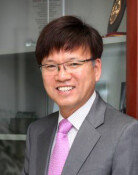Reactions Mixed Over Rejection of Hwangs Reinstatement
Reactions Mixed Over Rejection of Hwangs Reinstatement
Posted August. 02, 2008 09:31,
The Health, Welfare and Family Affairs Ministry yesterday decided not to allow disgraced cloning scientist Hwang Woo-suk to resume research on human embryonic stem cells in Korea.
Weve decided not to approve the request by the Suam Biotechnology Institute, where Dr. Hwang Woo-suk works as chief scientist, to begin research on human embryonic stem cells for medical treatment purposes," the ministry said.
Reasons cited were Hwangs 2006 dismissal from Seoul National University for fabricating stem cell research and his indictment for bioethics violations in obtaining and trading human eggs.
▽ Main reason for rejection
The lead researchers qualification was largely to blame for the decision, said Kwon Yong-hyeon, director general of the ministrys health industry bureau. Bioethics law requires chief researchers to have qualifications and experience in their fields.
In 2006, Hwang was banned from conducting research in Korea after admitting to falsifying the results of embryonic stem cell tests. He is now on trial for academic fraud, bioethics violations and embezzlement of state funds.
The scientist said he has technology for somatic cell nuclear transfer that helps create human embryonic stem cells, but the decision means lack of government recognition of his claim, experts say.
Lee Seong-cheon, a bioethics official at the ministry said, If the government allows Hwang, who stirred a global furor over his fake thesis, to resume research, it will invite more international controversy.
▽ Decision invites mixed reactions
The Suam institute criticized the decision, saying, Though Hwang is on trial, he should be considered not guilty until the final verdict is rendered. Rejection of a research plan having no legal problems is a politically motivated move.
Supporters of the disgraced scientist staged a rally in front of the ministry in Seoul the same day. Last month, dozens of them broke into the bioethics and safety office in the ministry building.
Certain Buddhist groups say they will stage protests against the decision. Hwang is a Buddhist.
Welcoming the rejection, however, were scientists, health professionals and Catholics and Protestants, but controversy is expected to continue since the decision cannot completely block Hwang from doing research.
The decision doesnt mean the government will reject all of Dr. Hwangs human embryonic research, Kwon said. The institute is free to file another appeal and a petition.
But Suam said it has no plan to file another request and petition for now.
▽ Govt urged to back stem cell research
Stem cell researchers say the decision is not a significant blow to domestic stem cell research. The countrys research in that field is now on track, they said, so Hwang is no longer needed.
An official at the Stem Cell Research Center under the Education, Science and Technology Ministry said, Though the Education, Science, and Technology Ministry suffered a setback due to Hwangs scandal, Korea has recovered global trust in the field and ranks fourth in the number of theses published in leading scientific journals.
Others say, however, that the decision will likely diminish the scientific importance of embryonic stem cells.
Embryonic stem cells cause significantly low immune reactions after being transplanted, said one researcher. Because of this, they have more potential than adult stem cells or induced pluripotent stem cells to result in cures for intractable diseases.
Many other stem cell researchers said the rejection was based on the qualification of one researcher. The government should elaborate how it reached its decision and clarify its support for stem cell research, they said.
On Hwangs future course of action, experts say he is likely to continue his research overseas.
Suam echoed this prediction, saying, Six research teams from four countries have suggested joint research on somatic cell nuclear transfer.
zozo@donga.com sohyung@donga.com







